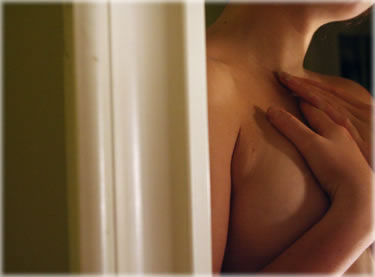For this week’s sex-and-relationships column, here’s the beginning of Part Three of Eric’s series on sexuality from 2008. That series, called “It’s Not About Sex. It’s About Self.” is an in-depth look into jealousy, self-esteem, compersion, intimacy and sexuality — and related topics. I’ve chosen Part Three because of its focus on self-esteem, which was a focus in Thursday’s subscriber issue as well as recent blog posts here on PW. — Amanda P.
Dear Friend and Reader:
THOUGH IT MAY be difficult to see, we have a serious self-esteem problem in our society. We are, in short, either taught that we don’t exist, taught to hate ourselves, or some combination of the two. Most people you see walking around on the street don’t feel worthy of love. And this seems to be a matter of selflove, or the lack thereof.

Fae from the Book of Blue by Eric Francis.
Self-hatred is perpetuated by nearly everything we see in the media, but most particularly advertising. It is reinforced hundreds of times a day, perhaps more boldly than any other emotion.
If we are lacking self-esteem — a problem so pervasive as to be invisible — we are going to have a lot of problems in relationships. This can account for much of our stuff around jealousy. For example, if we need a relationship to know that we exist, then we will naturally feel that our existence is threatened if our partner so much as smiles at someone else.
If much of our trip in relationships is designed to cover up a lack of real self-awareness, we are adding several dense layers of complication to finding out who we really are. It would seem that the real solution to our relationship stuff, our jealousy, our loneliness and many other factors, is to figure out who we are, enter a conscious relationship with that person, and then take that into our relationships with others.
In other words, we need to get to the place where the most honest relationship we have in the world is with ourselves, and then let that overflow into our encounters with the people around us — not forgetting what order these things happen. Unfortunately, we are taught to have relationships with ourselves that are based specifically on denying and deceiving ourselves. This is a sad state of humanity, but one that could be easily addressed — if we were somehow relieved of the fear to look within.
In today’s edition, I cover some points that have been raised over and over again, but which need to be repeated and I hope thought through. None of what you will read today is particularly original. We may feel that feminism has covered a lot of this ground, but it’s been a long time since. And a lot of things have happened since.


When listening to the masturbation post I thought again that I agree with no jealousy if it is about possession but that ‘jealousy’ is often a protest that the other doesn’t see you, and this is not just about ‘self’ but about the ‘other’, and equilibrium, fairness and everyone having a voice.
My father is at one extreme – he has stepped into ‘letting go into divine providence’ and will not even mention what he prefers or perhaps he doesn’t know or doesn’t find it relevant. As a mere mortal I find this frustrating – it would actually help me to have some input! At the other extreme I once lived with a guy who was apparently only aware of himself. To avoid being completely walked all over I became very adept at speaking up for myself. In my view this is not jealousy – there is no doubt a fine line between one to one, and ownership, or between self and or freedom, and unawareness of the other: but these lines are there.
Perhaps it is more correct to say there are no rules just: are you seeing clearly or not. Or: how clearly do you see at any given point.
(Perhaps I should clarify that Dad lives with us, which suits me because I know he is alright. But he is bedbound and needs help to eat and drink. Perhaps he feels he is a nuisance and so won’t mention if he prefers to eat this or that or is thirsty – just small things but I’m glad he is here and it would ease me it he could say… Perhaps equally he is glad to be here and doesn’t mind, knowing I will come back to him from time to time to see if he is hungry or thirsty…)
Wow, Eric, you wrote this article seven or eight years ago, and yet it still rings true today – one of those pieces of timeless information, thank you!
Will be passing this one on to my teenage and twenty two year old children to read!!
Namaste